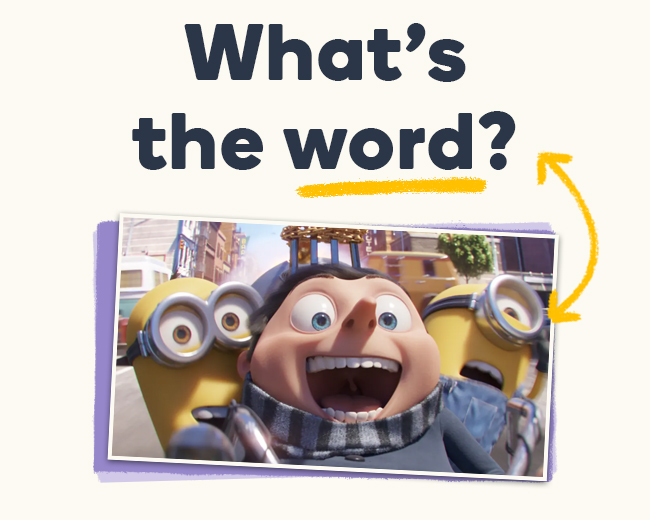Hello there, summer!
Last month, the Women’s Euros tournament kick off in England for the first time since 2005. Novak Djokovic scooped his seventh Wimbledon win (ok we get it, Novak!) Scientists in Japan have created a chopstick accessory that makes food taste salty without any salt. And we were treated to the closest, biggest and brightest supermoon of the year on July 13th, when the moon was a mere hop, skip and a jump away. Just 222,089 miles, in fact.
Now let’s come back down to Earth with this month’s knockout language and culture-related stories that have also caught our eye 👀!
GentleMinions, assemble!
This month, thousands of teens descended on cinemas in their Sunday best, thanks to a TikTok trend surrounding the new film Minions: The Rise of Gru. It all began in Australia, but soon spread to the US, UK and Asia. Our favourite thing about the Despicable Me franchise? Without a doubt, the unique dialect of Gru’s famous yellow sidekicks - and it turns out, they’re a lot smarter than their not-so-evil master gives them credit for. Their language is officially known as Minionese, and is a delightful mish-mash of words taken from a whole host of others. For example if you’re learning Spanish, you might pick up on ‘para tú’, which means ‘for you’. Japanese learners will hear ‘kanpai’, literally ‘cheers’, while Russian speakers recognise ‘Dä’ meaning ‘yes’. But it far from ends there. There are also influences from French, Italian, and Chinese, plus some brand new words with English roots. ‘Bello’ is ‘hello’ and ‘bapple’ means ‘apple’. Got it yet? If not, don’t worry, the Minions seem to speak fluent English too. Or at the very least, they know how to say “Ooh! Stuffed crust!”. And what else do you really need in life?

Gentleman Jack
Back in 2019, HBO and the BBC launched the historical drama Gentleman Jack. And boy, does it not do what it says on the tin. The series is based on the diaries of Anne Lister, a 19th-century landowner and writer who’s also credited as being ‘the first modern lesbian’. Her diaries, which tell the tales of her numerous and, at the time, illegal relationships are written mostly in a secret slang code - but it’s been partially cracked. Queer dialects were very common at the time, when instead of swapping numbers or hopping onto a dating app, gay people looking for love or lust had to find ways to carefully communicate between themselves. This even morphed into full-blown languages - the most famous of which is Polari. Built on rhyming slang and Italian-esque sounds, it includes words like ‘omipalone’, meaning homosexual, ‘lallies’ meaning legs, and ‘lucoddy’ meaning body.
While the bigotry of this time is so completely unbelievable in today’s world, we can only applaud the communities who managed to bravely create new ways to speak to each other even in the face of such hatred. Fantabulosa! (Excellent!)

Japanese word association
Love a little language challenge? Then you’re in luck! This month Atlas Obscura published this fun quiz, which is a helpful way to brush up on your Japanese nouns. It gives you a list of Japanese words, and claims that with nothing but logic, common sense, and nearly zero knowledge of Japan or it’s vocabulary, you’re going to be able to figure out what they mean. We won’t lie, even as language experts we had our doubts - but turns out, it’s all about patterns. We won’t say too much and spoil the fun, but if you keep your eyes peeled for parts of the Japanese words that are repeated, you should be able to crack the code. Ganbatte! (That means good luck).

Can you learn a language on TikTok?
As the most downloaded app of all time and with one billion active users worldwide, there’s zero doubt that TikTok reigns supreme when it comes to keeping people’s attention. It’s all too easy to fall down a scrolling rabbit hole - believe us, we know - and before you know it, you’ve wasted two hours of life watching overconfident cats fall off of various objects. But what if the time we spent #tiktokking was put towards learning instead? You can see where we’re going with this.
There’s a great hashtag called #TeachersOnTikTok, which teachers can use to share their knowledge, and we figured we should 100% be getting in on this action. So we did a bit of research, and found an even better hashtag: #edutoklanguage. This led us to a whole host of epic language teachers who can help you brush up on your learning. For starters, we teamed up with Patry Ruiz to help you spice up your Spanish - and the response was muy bueno. There’s plenty more in the pipeline, so hit up @memriseapp and give us a follow - you can even learn French with Dojacat (better add her to our ever-growing list of multilingual celebs!)

And that’s all for this edition of What’s the Word? Every month we round up some of the coolest things that are happening around the world and share them with you in the hope they’ll quench your language and general knowledge-seeking thirst just a little bit. Catch you next time!








